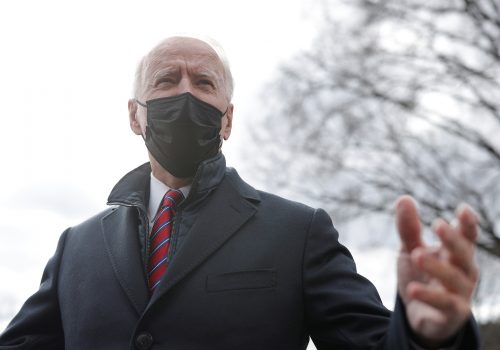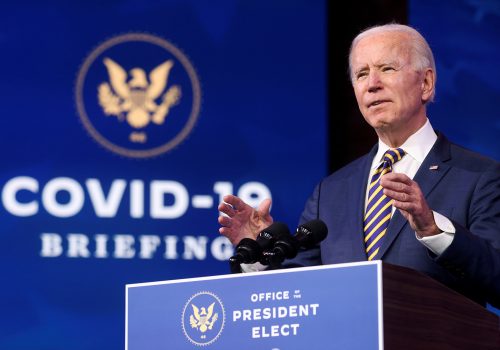FAST THINKING: The geoeconomics of Biden’s stimulus
JUST IN
It’s a done deal. Congress just passed Joe Biden’s American Rescue Plan, sending the $1.9 trillion package—the sixth stimulus since the COVID-19 outbreak and one of the largest economic-relief measures in US history—for the president’s signature. Don’t be fooled by the bill’s name, though; this legislation has huge implications not just for the United States but also for the pandemic-plagued world. Let’s break that down with our experts.
TODAY’S EXPERT REACTION COURTESY OF
- Josh Lipsky (@joshualipsky): Director of the GeoEconomics Center and former IMF senior advisor
- Julia Friedlander (@jfriedlanderdc): C. Boyden Gray senior fellow, deputy director of the GeoEconomics Center, and former National Security Council director
What happens in DC doesn’t stay in DC
- Before we get to the wider world, it’s worth taking stock of where this leaves the US economy. The stats are stunning. With this latest bill, Josh tells us, the United States “will have spent over 25 percent of its GDP—nearly $5.5 trillion—in the last twelve months on COVID-related relief. Compare that to 2009, when the US spent under $1 trillion. According to the OECD, America is now on pace for 6.5 percent growth in 2021 (some private banks are forecasting over 7 percent). This would be the highest growth rate since 1984. In fact, US growth could surpass China’s growth this year. You read that right.”
- Economists are forecasting that major US trading partners such as Germany, France, Japan, and China “will benefit from Americans having more money to spend” as a result of the new stimulus, he notes. “But the Biden team is wary of being solely responsible for restarting the global economic engine. They want the Europeans to try to match US efforts, or at least come close, to create a ‘virtuous cycle’ of economic growth that lasts beyond next year.” Expect the Biden team and Treasury Secretary Janet Yellen to press that case at the G20 finance ministers’ meetings in April. (The United States is way ahead of other G20 countries in providing fiscal relief during the COVID-19 crisis, according to new analysis from the GeoEconomics Center.)
- Here’s Josh‘s bottom line: “If the American Rescue Plan isn’t replicated in some form overseas, the US will snap back into a low-growth pace in 2022 and beyond. But if Biden can rally other countries to deploy fiscal firepower in a coordinated way, the 2020s could deliver a sustained global economic recovery.”
Subscribe to Fast Thinking email alerts
Sign up to receive rapid insight in your inbox from Atlantic Council experts on global events as they unfold.

The American hare and European tortoise?
- Julia flags a new OECD estimate that the Biden stimulus could boost global economic growth by 1 percentage point in 2021—an astounding impact for a single piece of legislation from one country. Across the Atlantic, however, the Eurozone may experience only “around half of the US recovery this year due to smaller fiscal injections and delays in vaccine rollout, and potentially take a year longer than the United States to reach pre-pandemic GDP.” That’s led many people to blame “cumbersome EU decision-making and fiscal hawks for failing to seize the moment.”
- But the US-EU comparison is “not apples to apples,” she cautions. The US labor market is very flexible, which in normal times is efficient but in this crisis is a liability. That flexibility creates “yo-yos in production and employment,” which means the United States has to spend a lot of money “to ensure labor-market stability, and it has the luxury of doing so when issuing the global reserve currency. That’s not the case in Europe, where furlough schemes have kept employment relatively stable and export-driven economies are more sensitive to fluctuating market conditions.” And don’t forget the EU’s own big COVID-era budget and recovery fund, plus domestic stimulus by member states, she tells us.
- Keep all this in mind “when you see the next headline saying that Europe is falling behind,” Julia advises. “While the US will be awash in cash, putting Band-Aids on a fractured and divided economy, the Eurozone will disburse funds for the next six years in strategic sectors such as digital services and green technology. Not that Europe isn’t fractured and divided, and that fiscal policy won’t occasionally cause a government to fall. But you’ve read the tortoise and the hare.”
Further reading
Tue, Feb 2, 2021
Three possible futures for the Biden presidency
New Atlanticist By Mathew Burrows, Robert A. Manning
Biden’s successes or failures will be determined by how the paradoxes of his presidency play out. The president is pursuing an extraordinarily ambitious social, economic, and foreign-policy agenda amid an exceptionally dire pandemic and recession—and with a razor-thin congressional majority, no less. He hopes to restore comity and bipartisan compromise to Congress, but his legislative skills will be tested by an obstinate Republican Party and worsening political tribalism.
Wed, Jan 20, 2021
FAST THINKING: Five big takeaways from Joe Biden’s inaugural address
Fast Thinking By
Joe Biden’s inaugural address was a call for unity—and also resilience. What did the speech signal about where his presidency is headed? Here's key takeaways from five leading experts on international affairs.
Thu, Jan 14, 2021
FAST THINKING: Biden’s $1.9 trillion message to Congress
Fast Thinking By
Joe Biden is unveiling a nearly two trillion dollar package aimed at beating back the pandemic and economic crisis. What’s the key thing to know?
Image: President Joe Biden takes off his mast before delivering remarks in Washington, DC on Monday, March 8, 2021. Photo by Kevin Dietsch/Pool/Sipa USA via Reuters


